Related Research Articles
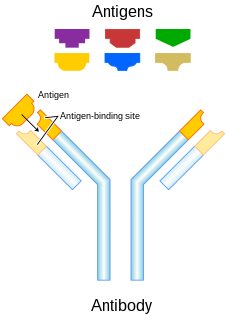
In immunology, an antigen (Ag) is a molecule or molecular structure or any foreign particulate matter or a pollen grain that can bind to a specific antibody or T-cell receptor. The presence of antigens in the body may trigger an immune response. The term antigen originally referred to a substance that is an antibody generator. Antigens can be proteins, peptides, polysaccharides, lipids, or nucleic acids.
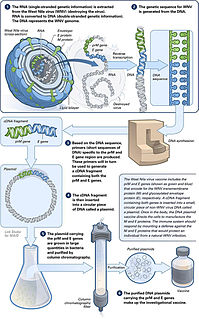
A DNA vaccine is a type of vaccine that transfects a specific antigen-coding DNA sequence into the cells of an organism as a mechanism to induce an immune response.
An epitope, also known as antigenic determinant, is the part of an antigen that is recognized by the immune system, specifically by antibodies, B cells, or T cells. The epitope is the specific piece of the antigen to which an antibody binds. The part of an antibody that binds to the epitope is called a paratope. Although epitopes are usually non-self proteins, sequences derived from the host that can be recognized are also epitopes.
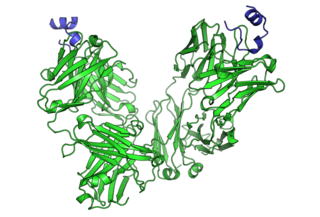
Cancer immunotherapy is the stimulation of the immune system to treat cancer, improving on the immune system's natural ability to fight the disease. It is an application of the fundamental research of cancer immunology and a growing subspeciality of oncology.

A toxoid is an inactivated toxin whose toxicity has been suppressed either by chemical (formalin) or heat treatment, while other properties, typically immunogenicity, are maintained. Toxins are secreted by bacteria, whereas toxoids are altered form of toxins; toxoids are not secreted by bacteria. Thus, when used during vaccination, an immune response is mounted and immunological memory is formed against the molecular markers of the toxoid without resulting in toxin-induced illness. Such a preparation is also known as an anatoxin. There are toxoids for prevention of diphtheria, tetanus and botulism.
Immunogenicity is the ability of a foreign substance, such as an antigen, to provoke an immune response in the body of a human or other animal. It may be wanted or unwanted:
An idiotope is the unique set of antigenic determinants (epitopes) of the variable portion of an antibody. In some cases it can be the actual antigen-binding site, and in some cases it may comprise variable region sequences outside of the antigen-binding site on the antibody itself. Thus each antibody would have multiple idiotopes; and the set of these individual idiotopes is termed the idiotype of the antibody.

Monoclonal antibody therapy is a form of immunotherapy that uses monoclonal antibodies (mAbs) to bind monospecifically to certain cells or proteins. The objective is that this treatment will stimulate the patient's immune system to attack those cells. Alternatively, in radioimmunotherapy a radioactive dose localizes a target cell line, delivering lethal chemical doses. Antibodies have been used to bind to molecules involved in T-cell regulation to remove inhibitory pathways that block T-cell responses. This is known as immune checkpoint therapy.
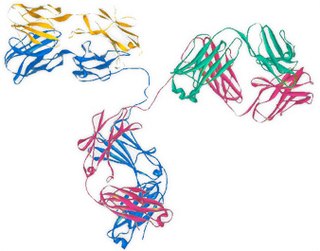
Abagovomab is a mouse anti-idiotype monoclonal antibody whose variable epitope mirrors a tumour antigen (CA-125) highly expressed in the epithelial ovarian cancer. Abagovomab does not bind directly to CA-125, but it works as a "surrogate" antigen, enabling the immune system to identify and attack tumour cells displaying the CA-125 protein. Through this, it is hoped that the body's immune system may be able to combat any remaining individual tumour cells and thus prevent recurrence of the disease.

A malaria vaccine is a vaccine that is used to prevent malaria. The only approved vaccine, as of 2021, is RTS,S, known by the brand name Mosquirix. In October 2021, the WHO for the first time recommended the large-scale use of a malaria vaccine for children living in areas with moderate-to-high malaria transmission. Four injections are required for full protection.

In immunology, an idiotype is a shared characteristic between a group of immunoglobulin or T-cell receptor (TCR) molecules based upon the antigen binding specificity and therefore structure of their variable region. The variable region of antigen receptors of T cells (TCRs) and B cells (immunoglobulins) contain complementarity-determining regions (CDRs) with unique amino acid sequences. They define the surface and properties of the variable region, determining the antigen specificity and therefore the idiotope of the molecule. Immunoglobulins or TCRs with a shared idiotope are the same idiotype. Antibody idiotype is determined by:
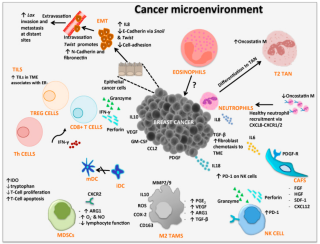
Cancer immunology is an interdisciplinary branch of biology that is concerned with understanding the role of the immune system in the progression and development of cancer; the most well known application is cancer immunotherapy, which utilises the immune system as a treatment for cancer. Cancer immunosurveillance and immunoediting are based on protection against development of tumors in animal systems and (ii) identification of targets for immune recognition of human cancer.
Immunocontraception is the use of an animal's immune system to prevent it from fertilizing offspring. Contraceptives of this type are not currently approved for human use.
An oncoantigen is a surface or soluble tumor antigen that supports tumor growth. A major problem of cancer immunotherapy is the selection of tumor cell variants that escape immune recognition. The notion of oncoantigen was set forth in the context of cancer immunoprevention to define a class of persistent tumor antigens not prone to escape from immune recognition.
The immune network theory is a theory of how the adaptive immune system works, that has been developed since 1974 mainly by Niels Jerne and Geoffrey W. Hoffmann. The theory states that the immune system is an interacting network of lymphocytes and molecules that have variable (V) regions. These V regions bind not only to things that are foreign to the vertebrate, but also to other V regions within the system. The immune system is therefore seen as a network, with the components connected to each other by V-V interactions.
Racotumomab is a therapeutic cancer vaccine for the treatment of solid tumors that is currently under clinical development by Recombio, an international public-private consortium with the participation of the Center of Molecular Immunology at Havana, Cuba (CIM) and researchers from Buenos Aires University and National University of Quilmes in Argentina. It induces the patient's immune system to generate a response against a cancer-specific molecular target with the purpose of blocking tumor growth, slowing disease progression and ultimately increasing patient survival.
Synthetic immunology is the rational design and construction of synthetic systems that perform complex immunological functions. Functions include using specific cell markers to target cells for destruction and or interfering with immune reactions. US Food and Drug Administration (FDA)-approved immune system modulators include anti-inflammatory and immunosuppressive agents, vaccines, therapeutic antibodies and Toll-like receptor (TLR) agonists.
Cancer vaccine targeting CD4+ T cells is a type of vaccine used to treat existing cancer. Cancerous cells usually cannot be recognized by the human immune system, and therefore cannot be destroyed. Some researchers state that cancer can be treated by increasing the response of T cells, especially CD4+ T cells, to cancerous cells through cancer vaccine injection.

Bjarne Bogen is a Norwegian immunologist, inventor and physician. He is widely known for his research on DNA vaccines, autoimmune disorders and cancer immunology.

Vabiotech COVID-19 vaccine is a COVID-19 vaccine candidate developed by the Vaccine and Biological Production Company No. 1 (Vabiotech) in Vietnam.
References
- ↑ "Racotumomab (1E10) anti-idiotype antibody - NGcGM3/VSSP vaccine | RECOMBIO". Archived from the original on 2013-01-05. Retrieved 2012-04-19.
- Ansel's Pharmaceutical Dosage Forms and Drug Delivery System (Page 513) ( ISBN 0-7817-4612-4)